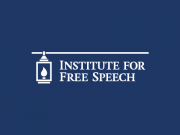On June 18, the Cato Institute hosted a book forum featuring several renowned figures in the campaign finance community. Shaun McCutcheon, the eponymous plaintiff in McCutcheon v. FEC, promoted his book, Outsider Inside the Supreme Court: A Decisive First Amendment Battle, about his experience in the judicial process as a political neophyte. Professor Ronald Collins spoke about his new book, When Money Speaks: The McCutcheon Decision, Campaign Finance Laws, and the First Amendment, which he co-authored with David Skover to analyze the case and the ruling’s implications. Also sitting on the panel were former Federal Election Commission (FEC) Chairman Don McGahn. Cato’s Ilya Shapiro moderated the event.
Shaun McCutcheon began by describing the ruling and what the case was about before then turning to his personal story. In the early years of his political activism, the complexity of campaign finance law overwhelmed McCutcheon. He was surprised when the Alabama Republican Party informed him that he was nearing his contribution cap. Because he respects the “First Amendment first,” McCutcheon decided to litigate and challenge the status quo. Unsurprisingly, he encountered much opposition from the campaign finance regulation lobby. Eventually, however, the Supreme Court ruled in his favor.
McCutcheon presented his reasoning for opposing aggregate contribution limits. Because individuals could only give so much, political action committees (PACs) swelled in number and in financial power. He argues that diverting money away from candidates and towards PACs defeats much of the stated purpose for regulating campaign finance. The faulty solutions to political corruption result in speech-suppressing regulation. McCutcheon postulates that incumbents, who get reelected over 90% of the time, are protected by campaign finance laws, which hurt the marketplace of political ideas. He concluded that the American paradigm is, “freedom never corrupts.” More money does not entail more corruption.
Ronald Collins outlined a series of reasons why McCutcheon is important to campaign finance law. Collins asserted that the Court shunned any collective perspective on the First Amendment. In the case, the Court narrowed the focus of what is considered corruption solely to quid quo pro corruption, questioning restrictions against mere perceptions or appearances of corruption. Collins believes that campaign finance cases characterize the Roberts Court, extending what the Burger and Rehnquist Courts did for commercial speech to Roberts’ views on political speech. Roberts writes most of the majority or plurality opinions in campaign finance cases, and is considered the Supreme Court’s First Amendment leader.
Don McGahn discussed the problems encountered by those working in the campaign regulatory environment before McCutcheon. The body of campaign finance law prevented individuals from supporting candidates of their choice with a wrongfully-imposed aggregate limit. The limits most hurt challengers who could not raise funds with capped-out donors. McGahn wondered if even Lincoln could have won under these burdensome laws. According to McGahn, regulation in this field does not encourage democratic competition, but instead starves political candidates of much needed funding.
Additionally, aggregate limits caused party committees to compete with each other, since each one fundraised within a limited pool of potential donors. This intra-party competition was awkward and needless, harming the parties’ ability to educate the electorate. The only way to support an informed democracy is to allow individuals to voice their concerns without limitation. McGahn made the important point that companies spend significantly vastly greater sums of money on fast food advertisements compared to the amount of money spent on political advertising in elections. He also suggested that limits ought to be adjusted over time to fully account for inflation.
If there’s one takeaway from the event, it’s that the fight for free political speech is far from over, but those on the side of defending the First Amendment’s guarantee that “Congress shall make no law…” are succeeding in their quest to undo arbitrary restrictions on political speech and associational rights.













